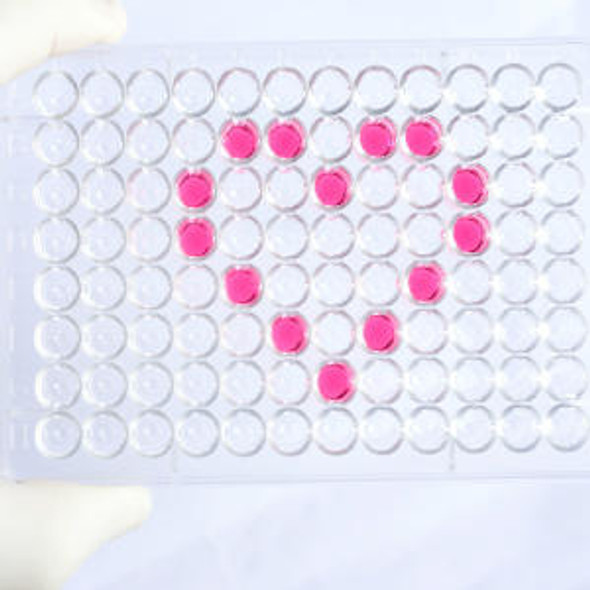Enzymes Recombinant Proteins
Human GLA Recombinant Protein (RPPB1935)
- SKU:
- RPPB1935
- Product Type:
- Recombinant Protein
- Species:
- Human
- Uniprot:
- P06280
- Research Area:
- Enzymes
Description
| Product Name: | Human GLA Recombinant Protein |
| Product Code: | RPPB1935 |
| Size: | 10µg |
| Species: | Human |
| Target: | GLA |
| Synonyms: | Alpha-galactosidase A, Alpha-D-galactosidase A, Alpha-D-galactoside galactohydrolase, Melibiase, GLA, GALA. |
| Source: | Sf9 Insect cells |
| Physical Appearance: | Sterile Filtered colorless solution. |
| Formulation: | GLA protein solution (0.5mg/ml) contains Phosphate Buffered Saline (pH 7.4) and 10% glycerol. |
| Stability: | Store at 4°C if entire vial will be used within 2-4 weeks. Store, frozen at -20°C for longer periods of time.�For long term storage it is recommended to add a carrier protein (0.1% HSA or BSA).�Avoid multiple freeze-thaw cycles. |
| Purity: | Greaterthan 90.0% as determined by SDS-PAGE. |
| Amino Acid Sequence: | LDNGLARTPT MGWLHWERFM CNLDCQEEPD SCISEKLFME MAELMVSEGWKDAGYEYLCI DDCWMAPQRD SEGRLQADPQ RFPHGIRQLA NYVHSKGLKL GIYADVGNKT CAGFPGSFGYYDIDAQTFAD WGVDLLKFDG CYCDSLENLA DGYKHMSLAL NRTGRSIVYS CEWPLYMWPF QKPNYTEIRQYCNHWRNFAD IDDSWKSIKS ILDWTSFNQE RIVDVAGPGG WNDPDMLVIG NFGLSWNQQV TQMALWAIMAAPLFMSNDLR HISPQAKALL QDKDVIAINQ DPLGKQGYQL RQGDNFEVWE RPLSGLAWAV AMINRQEIGGPRSYTIAVAS LGKGVACNPA CFITQLLPVK RKLGFYEWTS RLRSHINPTG TVLLQLENTM QMSLKDLLVEHHHHHH |
Alpha-galactosidase A (GLA) is a homodimeric glycoprotein which hydrolyses the terminal alpha-galactosyl moieties from glycolipids and glycoproteins. GLA catalyzes the hydrolysis of melibiose into galactose and glucose. Various mutations in the GLA gene affect the synthesis, processing, and stability of this enzyme, which causes Fabry disease (a rare lysosomal storage disorder which results from a failure to catabolize alpha-D-galactosyl glycolipid moieties).
GLA produced in Sf9 Baculovirus cells is a single, glycosylated polypeptide chain containing 406 amino acids (32-429 a.a.) and having a molecular mass of 46.4kDa (Migrates at 40-57kDa on SDS-PAGE under reducing conditions).GLA is expressed with an 8 amino acid His tag at C-Terminus and purified by proprietary chromatographic techniques.
| UniProt Protein Function: | GLA: Defects in GLA are the cause of Fabry disease (FD). FD is a rare X-linked sphingolipidosis disease where glycolipid accumulates in many tissues. The disease consists of an inborn error of glycosphingolipid catabolism. FD patients show systemic accumulation of globotriaoslyceramide (Gb3) and related glycosphingolipids in the plasma and cellular lysosomes throughout the body. Clinical recognition in males results from characteristic skin lesions (angiokeratomas) over the lower trunk. Patients may show ocular deposits, febrile episodes, and burning pain in the extremities. Death results from renal failure, cardiac or cerebral complications of hypertension or other vascular disease. Heterozygous females may exhibit the disorder in an attenuated form, they are more likely to show corneal opacities. Belongs to the glycosyl hydrolase 27 family. |
| UniProt Protein Details: | Protein type:Lipid Metabolism - sphingolipid; Lipid Metabolism - glycerolipid; EC 3.2.1.22; Glycan Metabolism - glycosphingolipid biosynthesis - globo series; Hydrolase; Carbohydrate Metabolism - galactose Chromosomal Location of Human Ortholog: Xq22 Cellular Component: cytoplasm; extracellular region; Golgi apparatus; lysosomal lumen; lysosome Molecular Function:alpha-galactosidase activity; catalytic activity; hydrolase activity; protein binding; protein homodimerization activity; receptor binding Biological Process: glycosphingolipid catabolic process; glycosphingolipid metabolic process; glycosylceramide catabolic process; negative regulation of nitric oxide biosynthetic process; negative regulation of nitric-oxide synthase activity; oligosaccharide metabolic process Disease: Fabry Disease |
| NCBI Summary: | This gene encodes a homodimeric glycoprotein that hydrolyses the terminal alpha-galactosyl moieties from glycolipids and glycoproteins. This enzyme predominantly hydrolyzes ceramide trihexoside, and it can catalyze the hydrolysis of melibiose into galactose and glucose. A variety of mutations in this gene affect the synthesis, processing, and stability of this enzyme, which causes Fabry disease, a rare lysosomal storage disorder that results from a failure to catabolize alpha-D-galactosyl glycolipid moieties. [provided by RefSeq, Jul 2008] |
| UniProt Code: | P06280 |
| NCBI GenInfo Identifier: | 113499 |
| NCBI Gene ID: | 2717 |
| NCBI Accession: | P06280.1 |
| UniProt Secondary Accession: | P06280,Q6LER7, |
| UniProt Related Accession: | P06280 |
| Molecular Weight: | 48,767 Da |
| NCBI Full Name: | Alpha-galactosidase A |
| NCBI Synonym Full Names: | galactosidase alpha |
| NCBI Official Symbol: | GLA�� |
| NCBI Official Synonym Symbols: | GALA�� |
| NCBI Protein Information: | alpha-galactosidase A |
| UniProt Protein Name: | Alpha-galactosidase A |
| UniProt Synonym Protein Names: | Alpha-D-galactosidase A; Alpha-D-galactoside galactohydrolase; Melibiase; INN: Agalsidase |
| Protein Family: | Glacontryphan |
| UniProt Gene Name: | GLA�� |
| UniProt Entry Name: | AGAL_HUMAN |






